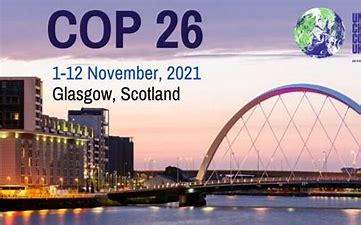So, what about Glasgow? What’s it all about? And what are the possible outcomes?
The journey to the Glasgow Climate Summit has and is a challenge because of the COVID-19 pandemic. It was moved from November 2020 to November 2021 to enable governments to meet in person.
We now know that it is unlikely that the Bonn June meeting will happen in person. Will it become a virtual negotiation? I personally think that would not work.
I would hope it could be added on to the meeting in Italy so that most of October would become a prepcom for Glasgow. The advantage of this is member states and stakeholders would be travelling once though perhaps if it merges into Glasgow so it could become a six week combined event.
There are a series of
meetings and negotiations that will help build momentum and we also hope
commitments. Between April and November, the key meetings that will feed into the
Glasgow Summit include:
April 22nd US President
Biden Heads of State Climate Summit
May 17-30th UN
Biodiversity Convention (TBC)
June Bonn 31 May – 10
June (TBC)
June G7 UK hosted
September UN General
Assembly – Climate Week 21- 30 September 2021
September UN Secretary General’s Dialogue on Energy
September/October 30th -2nd Italy
October G20 Italy
November 1-12 UNFCCC Glasgow
On the Agenda for discussion
and negotiations for Glasgow are:
- Revision of the UNFCCC reporting guidelines on annual inventories for developed countries to the Convention; and outline for the modalities, procedures and guidelines for the transparency framework.
- Common metrics to calculate the carbon dioxide equivalence of greenhouse gases; and
- Emissions from fuel used for international aviation and maritime transport.
- Land use, land-use change and forestry.
- Market and non-market mechanisms under the Convention.
- Where are we on National Determined Contributions (country targets) and the Green Climate Fund.
The UK has five priority areas for additional activity
and agreements these are 1) Clean Energy, 2) Clean Transport, 3) Nature based
solutions, 4) adaptation and resilience built into recovery packages from COVID
and 5) finance – aligning our public and private finance to address climate
change.
The UK announced aims for
Glasgow are:
- All countries to submit more ambitious Nationally Determined Contributions, committing to further cuts in carbon emissions by 2030.
- All countries to commit to reach net zero emissions as soon as possible.
- Developed countries to honour their commitments, including meeting the 100-billion dollar goal for beyond 2020 from the Paris Climate Agreement for climate finance.
- Seeking to agree a package which takes forward the Paris Agreement.
Possible outcomes from
Glasgow could include:
- National Determined Contributions: further cuts in carbon emissions by 2030 and to reaching net zero as soon as possible.
- Clean energy: low costs of renewables to boost growth and create jobs as part of the building back better COVID-19 recovery packages.
- Clean transport: this would include the acceleration of the use of electric vehicles, the promotion of ways to reduce air transport carbon contribution by using household waste to air fuel and research into synesthetic fuels. For shipping promoting the using of alternatives such as ammonia Cars-lorries – electric (Norway 40% new cars are electric).
- Adaptation and resilience: Building into the recovery plans so we can better prepare for the next crisis while supporting the global economy more towards greener technologies.
- Finance: $100 billion a year commitment but as we will need trillions not billions securing commitments from the private finance sector t to align investment around helping to address climate change: elements to help this include: Green Bonds, SDG Public Private Partnerships – People First.
- Coalition of the Willing - setting up in other countries a similar approach to the “America’s Pledge” where states, cities and businesses and other stakeholder summit to their own targets.
Those interested in being part of the solution can register
their commitments to the Race to Zero campaign on the UN web site as part of
the Climate Ambition Alliance. The Climate Ambition Alliance brings together
countries, businesses, investors, cities and regions who are working towards
achieving net-zero CO2 emissions by 2050.
Country engagement in this Alliance is led by the
governments of Chile and the United Kingdom, with support from UN Climate
Change and UNDP; while mobilization of a non-government actors is led by the
High-Level Climate Champions for Climate Action.




Comments
Post a Comment